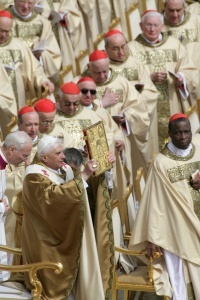c. 2008 Religion News Service
VATICAN CITY _ When Pope Benedict XVI recites the opening verses of Genesis on Italian national television next Sunday (Oct. 5), he will kick off a marathon reading of the entire Bible by some 1,500 people over six days _ and do something that would have been unthinkable even a generation ago.
Catholics over the age of 50 are old enough to remember when the church discouraged non-clergy from acquainting themselves with Scripture, apart from selections quoted in their catechisms or read aloud at Mass. But that traditional attitude has shifted amid the many dramatic changes in Catholicism that began in the 1960s.
“Ever since the Second Vatican Council, there has been a concerted effort on the part of the church to take back the Bible for Catholics,” said the Rev. Thomas D. Williams, an American who teaches theology at Rome’s Regina Apostolorum University.
The latest step in that effort will begin the same day as Benedict’s televised Bible reading, when some 250 bishops and heads of religious orders from around the world gather in Rome to discuss the “importance of the Word of God in the life and mission of the Church.”
This session of the world Synod of Bishops, the 22nd such meeting to take since Pope Paul VI established the body in 1965, will last three weeks. It will feature an unprecedented number of women participants _ 25 of 78 papally appointed advisers and observers _ and the first non-Christian ever to address the assembly, Israeli Rabbi Shear-Yashuv Cohen, who will speak about Jewish interpretation of the Hebrew Bible.
Topics of discussion will certainly include how to increase Catholics’ familiarity with Scripture.
A survey commissioned in preparation for the Synod showed Bible-reading in traditionally Catholic European countries to be markedly less common than in the United States. Only 38 percent of Poles, 27 percent of Italians, and 20 percent of Spaniards had read even one passage of Scripture over the previous year, the study found, compared to 75 percent of Americans.
Of equal concern to the bishops is how Catholics understand Scripture when and if they read it. The Synod’s official agenda notes the increasing popularity of “fundamentalism,” which it says “takes refuge in literalism and refuses to take into consideration the historical dimension of biblical revelation.”
Earlier this month, Benedict himself stated that a proper understanding of the Bible “excludes by its nature everything that today is known as fundamentalism,” and insisted that the “word of God can never simply be equated with the letter of the text.”
As they reaffirm the church’s teaching authority, or magisterium, the bishops will also discuss the compatibility of Catholic doctrine with modern methods of interpretation that Catholic scholars have increasingly adopted since Vatican II.
In his bestselling book “Jesus of Nazareth” (2007), Benedict affirmed the value of the so-called historical-critical method, but warned of its limitations when detached from theology.
“Interpretation of Scripture … must always avail itself of the scientific research … ,” Cardinal Marc Ouellet, the Synod’s chairman, told an Italian newspaper earlier this year, “but at the same time it must not place itself in competition with, or opposition to, the magisterium.”
KRE/LF END ROCCA
575 words
File photos of Benedict XVI are available via https://religionnews.com.





